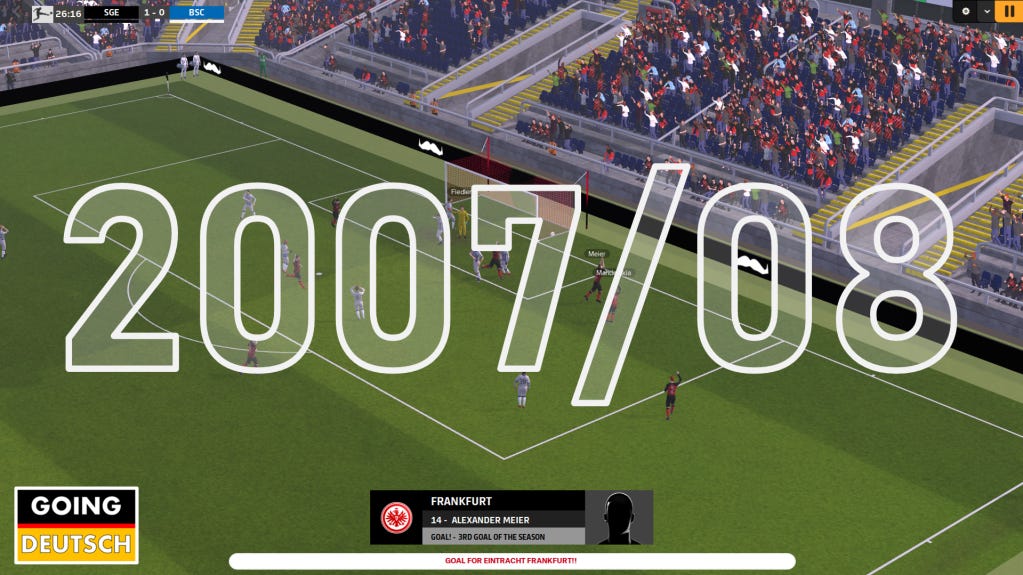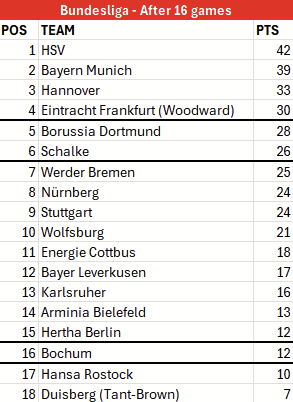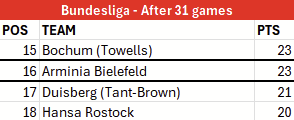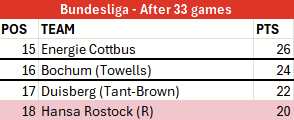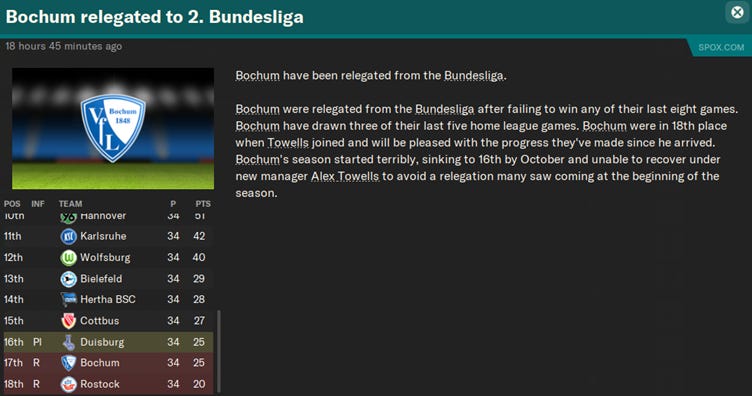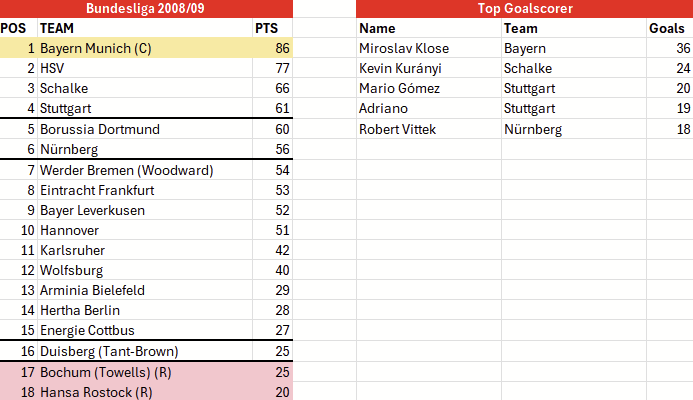Going Deutsch Editor Save: 2007/08
A new version of the Football Manager editor save starts, as the 1000 Hours managers travel back in time to 2007.
Do you ever sit there thinking that football was better in the past? If you're my age, do you yearn for the football you remember from your childhood? Do you want to see what would have happened if Eric Djemba-Djemba had played in the Bundesliga? If you answered ‘yes’ to any of these questions, Football Manager may have the answer for you. For years now, The Mad Scientist has uploaded retro databases to the Steam Workshop. These have ranged from the 80s to the 2000s. This season, they’ve uploaded a database that takes players back to the 2007/08 season. Following on from the Going Deutsch editor save on the 1000 Hours podcast back in the day, I thought it was time to bring the series back in article format. 2007/08 is a great season to pick in this regard. Stuttgart were reigning league champions, Bayern’s dominant run of eleven-straight titles was years away, and St. Pauli had just been promoted back to the second tier. There’s no Hoffenheim in the top-flight and Rasenballsport Leipzig don’t exist. Even if I didn’t watch the league at the time, I don’t think there can be any debate that the Bundesliga was just better back then. With that in mind, it’s time to take our three managers from the podcast and see how they can do as we alter the past of German football. With any hope, we can save the future.
Pre-season, 2007
July 2007: The first iPhone is taking the world by storm, Angela Merkel is less than two years into her reign as Chancellor, England has just banned smoking indoors, and Bundesliga sides are returning to pre-season training ahead of the 2007/08 season. Our three managers were assigned to their new clubs based on a random generator. Alex Woodward (whom I’ll refer to in the third person throughout this as I’m not in control of my character) was hired by Eintracht Frankfurt. Die Adler were a yo-yo club at this point in history, having spent five of their prior eleven seasons in the second tier and having not finished above 14th in the top flight in that span. In real life, Frankfurt would secure their first top-half finish since 1994/95, when Jupp Heynckes was manager and when their top goal scorers were Jay-Jay Okocha and Tony Yeboah. No one notable had come in before Woodward joined the club. Afterwards, he would sign Malik Franz from Karlsruher and Youssef Mokhari from Tant-Brown’s Duisburg. He would also confirm the loan signing of Mark Viduka from Newcastle, the Australian would therefore join Tony Yeboah, Robin Koch and others in the ‘Played for Frankfurt and Leeds’ club.
Whilst Woodward was moving to the Waldstadion, Towells was moving to the Olympiastadion as the new manager of Hertha Berlin. Towells would be dealing with a few managers of his own. Pál Dárdai had been a player since 1997, and they had also signed current Stuttgart manager Sebastian Hoeneß in the transfer window. He had massive departures though, before he arrived: Kevin Prince-Boateng, Christopher Samba, and Filip Krstic. Towells himself would make just one signing, bringing in Mate Ghvinianidze from second-tier 1860 Munich for €275,000.
Alex Tant-Brown meanwhile would end up at newly promoted Duisburg. Duisburg had been regulars in the Bundesliga through the opening two decades of the competition and were also semi-regulars in Europe. After relegation for the first time in 1982, they had spent more time in the second tier than in the top-flight, even making a brief appearance in the third-tier Oberliga in the mid-1980s. In real life, 2007/08 would mark Die Zebras' last season in the Bundesliga, having flip-flopped between the second and third tiers. Duisburg would be relegated to the fourth tier Regionalliga for the first time in their history last season. It’s safe to say that Tant-Brown had been given the toughest hand. However, he also had the most transfer activity, having spent €1.2 million. Most of that was pre-Alex’s arrival, Christian Tiffert and Tom Starke joining for a combined €800,000, whilst Timo Rost, Markus Weissenberger, and Moussa Ouattara rounded up the rest of the spending once Tant-Brown had arrived.
Transfers outside of the three clubs show an interesting blend of matching reality and taking us into a new world. Bayern II defender Mats Hummels was very close to joining St. Pauli (if only) but made the same move he did in real life to Borussia Dortmund, if one year earlier. Marco Reus meanwhile did not make the same move back to his boyhood club, as he did in 2012, instead joining Bayer Leverkusen. Honestly, I felt bad for St. Pauli and thought they deserved a promising defender too, so I signed Vincent Kompany from city rivals HSV, weakening them in the process. Other youngsters, Holger Badstuber, Arturo Vidal, and Eric Maxim Chupo-Moting, would be loaned to 2. Bundesliga sides Aachen, Kaiserslautern, and 1860 Munich respectively. By the end of the transfer window, the biggest spenders in the division were Bayern Munich, who reacted to not winning the title by spending €98 million in a time when that wasn’t the norm. In the process, they comfortably outspent the rest of the league, which resembles the norm a bit more. Outside of those signed in the real world, Joaquín signed for €22 million, Rafinha joined a few seasons before joining Bayern in real life for €12 million, and Vágner Love joined from CSKA Moscow for €2 million.
The dream eleven is both a great trip down memory lane and a good tool to highlight where we are starting. A 38-year-old Oliver Kahn enters the save after 13 years in the Bayern goal and remains the top goalkeeper in the league. He’s joined by fellow Bayern stars Willy Sagnol, Zé Roberto, new Bayern signing Franck Ribéry, and Miroslav Klose. Werder Bremen, coming off a 3rd placed finish the season before have the great Torsten Frings and greater Diego in the dream eleven, and champions Stuttgart have two players of their own in Fernando Meira and Pável Pardo.
August 2007: We begin
As always in German football, the season started with the opening round of the DFB Pokal. Towells and Hertha Berlin would have the best start by beating Rot-Weiß Koblenz 4-0, with Lukasz Piszczek scoring twice. Eintracht Frankfurt would take on a Saarbrücken side that knocked them out of the Pokal in real life last season. History (or in this case, the future) would not repeat itself as Frankfurt came from 1-0 down to win 2-1. Tant-Brown did not get off to quite the same start, but his Duisburg did beat Eintracht Braunschweig on penalties after a 1-1 draw. There were the usual upsets as well, Unterhaching won on penalties against 2. Bundesliga Aachen, Koblenz from the same tier would be knocked out by Viktoria Köln, and Sandhausen would knock out second-tier Paderborn.
It was here that I saw something worrying. Despite being founded in 2009, Rasenballsport Leipzig were in the game. I assume this is authenticity on the part of the creator, The Mad Scientist, so that Leipzig ascend through the German football pyramid like they unfortunately did in real life. This editor save though is a chance to change the past 18 years of German football for the better. As a result, the in-game editor was properly utilised to turn RB amateur and destroy their ground. Hopefully, we won’t hear much of them for the rest of the save.
One week later, the Bundesliga season would start. Despite coming fourth the season before, Bayern Munich were the overwhelming favourites at 2/5 to win the league, Werder were second favourites at 11/1, and reigning champions Stuttgart were third favourites at 16/1. At the other end, Rostock were expected to come last, and Bochum and Karlsruher were also expected to be in the relegation places. Regarding our three sides: Hertha were expected to come 9th, Frankfurt slightly lower in 11th, and Duisburg hoped to just avoid the drop in 15th. In the race for top-goalscorer, Luca Toni was the favourite, fitting because he did finish the season in real-life as the winner of the Torjägerkanone. Miroslav Klose was the favourite for Player of the Season, with Diego and Toni as joint second favourite.
Reigning champions Stuttgart kicked off the season at home to second-favourites Werder and won 2-0 thanks to goals from Mathieu Delpierre and new signing Adriano. Having been one of the best players in world football up until the 2005/06 season, Adriano’s ability fell off a cliff in part due to injury and in part due to his father's death. Of course, Football Manager is unaware of these events, which may allow him to remain at the top of the European game for much longer. The three managers meanwhile did not get off to a good start: Woodward was the best of the bunch, but that was only a 2-2 draw with Rostock, Towells and Hertha would lose 1-0 away at Dortmund, whilst Tant-Brown would lose 6-1 on the opening day away at Schalke. That defeat might have looked even worse the week after when Frankfurt would beat Schalke 3-0 for their first win of the season. By the end of the month, Alex Tant-Brown was the only manager without a point, scoring just one and conceding eleven in three games. Hertha were in 11th after a dominant 4-0 win against Arminia Bielefeld, and Frankfurt were one of four sides who were joint first as a win against Leverkusen meant Die Adler were on 7 points. Joining Eintracht at the top of the league were Nürnberg, Dortmund, and HSV.
September 2007: The 1000 Hours Battles
September would see the first of the 1000 Hours battles (as games between our managers should be called). MSV Arena hosted as Tant-Brown and Towells faced off in a battle between Duisburg and Hertha Berlin. The hosts dominated the opening stages of the game and in the 25th minute, they would get a penalty when Manasseh Ishiaku went down in the box. Despite being ten years away from being invented, VAR would confirm the call (FM24 can’t entirely recreate 2007), and Stefan Blank would score the elfmeter. That lead was much deserved and would hold to half-time. Early in the second half, Duisburg doubled their advantage as Markus Weissenberger was left completely unmarked from a free-kick to fire into the top corner. Finally, Hertha got into the game and their first chance would lead to their first goal thanks to Lukasz Piszczek. With their second shot came their second goal, a long ball from Jaroslav Drobný went over everyone's head and through to Marko Pantelic to slot home. It then looked like Hertha’s third shot had resulted in their third goal in the 85th minute, but VAR unrealistically intervened and saved Duisburg from a defeat. That would have been Tant-Brown’s first win of the season, but Towells denied him, marking a small amount of consolation after Towells had been sacked by Tant-Brown in my last German editor save.
One week later, Tant-Brown would take his side to Frankfurt for a meeting with Woodward’s European chasing team. Again, Duisburg started better and took the lead in the 6th minute through Mohamadou Idrissou. Frankfurt had their first chance in the 29th minute, and like Hertha, they used that to score. That came when Christoph Preuß turned in a Mark Viduka free kick. Just like Duisburg in the game prior, Frankfurt would score with their first chance of the second half to get their second of the game, Benjamin Köhler with a good curling shot from outside the box. Mehdi Mahdavikia would have a similar finish from the other side of the box for a 3-1 lead. Duisburg’s Ivica Grlić would score a great goal of his own, but it wouldn’t be enough for Duisburg as Frankfurt won 3-2.
That result meant that at the end of September, Alex-Tant Brown’s Duisburg were on just two points, joint bottom of the league alongside a Hansa side who also had no wins. Wolfsburg were in the relegation play-off places with 4 points, Hertha Berlin were in 11th on 7 points, whilst Frankfurt were in 6th on 11 points. Despite my selling of Vincent Kompany, HSV led the way with 16 points from six games, ahead of Bayern and Dortmund in second and third. The next meeting, this one being Woodward vs Towells, was not as close as the other clashes. Eintracht won 3-0 and bar a Hertha goal being disallowed for a narrow offside, BSC did nothing to compete. By the end of October, Alex Tant-Brown’s position was officially under threat. His Duisburg side were still winless (after nine), and still joint last with Hansa.
Whilst he was having no luck in the Bundesliga, he did win in the second round of the Pokal against 2. Bundesliga Augsburg, the other two managers would also see wins: Frankfurt beating Schalke 2-1 and Hertha beating Bochum 4-1. That win for Tant-Brown might have been the thing that brought him enough time to ensure he wasn’t the first Bundesliga manager sacked in 2007/08. That honour instead fell to Bayer Leverkusen's Michael Skibbe. Skibbe became the youngest manager in the history of the Bundesliga at 32 when he took over at Borussia Dortmund in 1998. His reign at Bayer Leverkusen would end in real life when he failed to qualify for Europe in the 07/08 season. In FM, he was sacked because his Leverkusen side were closer to relegation than Europe at the end of November. At this point, I discovered another unrealistic aspect of the retro database. Leverkusen hired Thomas Letsch in Skibbe’s place. You might remember Thomas Letsch as the recent manager of Bochum. In 2007, Letsch was a year away from becoming the manager of Sonnenhof Großaspach in the fifth tier. Letsch therefore wasn’t hired for his 2007 CV but his 2024 CV, something we’ll probably become more and more aware of as the game progresses.
Tant-Brown would need 15 attempts to win his first game in the Bundesliga, but his Duisburg side finally managed to claim all three points as they won 2-0 at home to Bochum. The same weekend, Alex Towells was sacked as Hertha Berlin manager. Whilst I had focused on Duisburg’s struggles to win a game, Hertha had nosedived following a good start to the season. That 2-2 draw against Duisburg back in September was the first of eleven winless in the Bundesliga. In a way, Tant-Brown had sacked Towells again. He was close to getting the Schalke job, but Louis van Gaal had gotten in before Hertha dismissed Towells. Instead, he would have to wait for 2008 until he could get a new role.
January 2008: A little help
As Towells was waiting for a new job, Hertha announced their new manager, remarkably hiring former England manager Sven-Göran Eriksson to take over at the Olympiastadion. Granted, he would be starting on the back foot as I planned to take revenge on Hertha for sacking Towells whilst helping Tant-Brown at the same time. As soon as the transfer window opened, I transferred Hertha’s three best players: Miniero, Arne Friedrich, and Gilberto to Duisburg on frees. Outside of those, Tant-Brown himself also signed Teemu Tainio from Spurs (his favourite club after Leeds), and Patrick Helmes from Köln. Those signings seemed to do the trick as Duisburg would beat Hansa in a bottom-of-the-table clash 4-2 to begin 2008. Sven, on the other hand, lost his first Hertha game 7-0 to Bayern Munich, who took the lead of the league for the first time that season.
Woodward meanwhile would have ups and downs in the window. He lost his best player up to that point as Patrick Ochs went to Spurs for €12 million. He was able to react by poaching Clemens Fritz from Werder Bremen. Eintracht also signed Sylvain Marveaux and Vlad Munteanu. Elsewhere in the transfer market, Lars Bender would make his move to the Bundesliga and Stuttgart, Neven Subotic would move to Wolfsburg, and Toni Kroos would leave Bayern for Werder Bremen. Also, Eric Djemba-Djemba signed for Hertha for €1.8 million, so there’s that.
If I’d allowed Towells to travel outside of the Bundesrepublik, there would have been a few interesting jobs open to him: Juventus, Villarreal, and Everton. Unfortunately, the rules of this save are that our three managers have to stay in Germany. The only job that had come open was Hoffenheim’s in the second tier after Ralf Rangnick left for Birmingham. I didn’t want Towells to have to go to such a team. For what it’s worth, Rangnick lasted just six games with City before getting the sack, making this trip to England even less successful than his stint with Manchester United in real life. Whilst Tant-Brown had struggled in the league, he progressed further than anyone else in the cup. Frankfurt were knocked out in the third round thanks to a 1-0 defeat against Bayern, whilst Duisburg beat Nürnberg. Tant-Brown was close to knocking out Dortmund in the quarter-finals, but Alexander Frei equalised in the 97th minute, and BVB would go on to win in extra time.
February would see the last of the original 1000 Hours battles. Woodward would complete the sweep with a 4-2 win over Duisburg, which was much closer than the final score suggests. Luckily for Tant-Brown, a 1-0 win away at Cottbus the week after would see MSV escape the drop zone for the first time all season. Whilst Tant-Brown was celebrating, HSV were commiserating, a three-point lead over Bayern at the winter break had turned into no points heading into February before three straight defeats meant they were nine points down on Bayern before March had begun.
As winter turned to spring, Alex Towells had a new job. Bochum had lost seven games on the bounce to go from 14th to last, costing Marcel Koller his position. Towells had walked into a bad situation. The side were much worse than the one he had left at Hertha Berlin and relegation felt more likely than possible. However, Towells would immediately win his first two games in charge: 3-0 against former club Hertha, and 3-2 against Wolfsburg. The latter thanks to an 87th-minute penalty, jumping out of the relegation places in the process and putting Tant-Brown’s Duisburg straight back in. This was still a shame for Towells because a week after becoming the Bochum manager, his Werder side decided to sack Thomas Schaaf after nine years at the helm. A few big names were linked with a move to the side, then sat in 10th in the Bundesliga: Mainz’s Jürgen Klopp, West Ham’s Alan Curbishley, and Thomas Reis, who hadn’t begun his managerial career in 2008. Who they decided to hire instead stunned me – Eintracht Frankfurt’s Alex Woodward.
May 2008: Six-pointer
Perhaps it was for the best. Having been in a Champions League race all season, a run of five winless had seen Frankfurt fall to 8th, four points off the UEFA Cup positions. It was also for the best as Werder are a side I much prefer to Frankfurt in real-life. Woodward had three games to play out to end the season with nothing to play for. The same was not true for the other two managers. The first game in May was Towell’s Bochum vs Tant-Brown’s Duisburg in a real relegation six-pointer.
For a large part of the game, it looked like Duisberg would hold on to a 2-1 lead, which they had held since the 36th minute. Gilberto had scored the first of those two goals for MSV, but the new signing from Hertha would play a horrible pass that was capitalised on by a wide-open Stanislav Sestak. He tapped in for Bochum and that made it 2-2. That draw for Towells, coupled with Bielefeld winning 1-0 away at Wolfsburg, led to his side dropping into the relegation play-off place. Woodward meanwhile had a less dramatic time, coasting to a 5-0 win away against Sven-Goran Eriksson’s Hertha. Even better came on the penultimate matchday when Bremen came from 2-0 down to beat Bayern 3-2 at the Weserstadion. The day after that, Bielefeld won 2-1 against Hansa Rostock to save themselves and relegate Hansa (thank you, Arminia). Duisburg and Bochum would both lose, meaning they would fight against Energie Cottbus to stay up on the last day of the season.
Bochum hosted Energie Cottbus whilst Duisburg travelled to already relegated Hansa Rostock. For Duisberg to stay up, they would have to win and hope Bochum didn't. However, VfL immediately went on the front foot by taking the lead in the 3rd minute, seizing on a misplaced pass by Cottbus defender Igor Mitreski. In the 25th minute though, Bochum’s Christoph Dabrowski gave away a penalty which Shola Ameobi converted to make it 1-1. For the longest time, it looked like it didn’t matter, but as the seconds ticked down at the rewirpowerStadion in Bochum, some horrible news filtered through. 450km away in Rostock, Duisburg were given a penalty in the 92nd minute. Stefan Blank scored to make it 1-0, giving Duisburg a shot at the relegation play-off and relegating Bochum on goals scored.
After winning his first two in charge, Towells managed just three points through his final eight games compared to eight for Tant-Brown. Elsewhere, Bayern had been celebrating the title for a month; they coasted to another league win following HSV’s earlier-than-usual collapse in February. Huub Stevens did at least keep the side in second, ahead of Louis van Gaal’s Schalke. Dortmund meanwhile did a Dortmund, needing just a win on the last day of the season for Champions League football, they collapsed in a 3-0 defeat to Leverkusen, allowing Stuttgart to take their place in the top four. The season was over for all but Duisburg, waiting for them in the relegation play-off was Volker Finke’s Freiburg.
Before Streich, there was Finke. The Nienburg native first took over at Freiburg in 1991 and remained in real life until 2007. Having managed the side for 5843 days, he was the longest-serving manager in German football history before Frank Schmidt broke his record in 2023. Why he didn’t leave at the end of 06/07 in-game like he did in real life is beyond me, but it made Tant-Brown’s job much harder as his side hosted the first leg. Freiburg dominated the first half, but Duisburg opened the scoring three minutes into the second half through Klemen Lavric. MSV would hold that score and travel to the Dreisamstadion with a lead for the second leg. In an inverse of the first game, Duisburg would dominate the first half only for Freiburg to score early in the second through Ivica Banović. 1-0 Freiburg on the night, 1-1 overall. Tant-Brown’s side would take the aggregate lead back in the 70th minute through Björn Schlicke, and that would be enough for Duisburg to retain their Bundesliga place.
Tant-Brown had been dealt the toughest hand at the beginning of the season, but he had overcome a lot in the rückrunde to secure his place in the top-flight for another season. Perhaps he was the best of our managers for that reason. Woodward had won all his games in charge of Werder to overtake his former side on the last day, whilst Towells had been good but not good enough with Bochum. He did ensure he wouldn’t face a second sacking though, meaning he’ll enjoy the best league in the world as we enter 2008/09.

